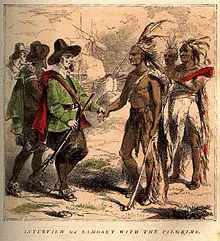Samoset
Samoset holds a unique position in American history as he was the first Native Indian to talk to the Plymouth Colony pilgrims.
His past is unknown, and historians aren’t even sure if Samoset was his given name. While he was sent by the Wampanoag people in the area, Samoset was visiting from his own tribe in what is now the state of Maine. The unusual situation about Samoset is that he spoke English that was taught to him by English Fishermen in the north.

Where did they live?
Samoset is sometimes referred to as Somerset, which could be a name given to him by the pilgrims, as it related to the town of Somerset in England.
Samoset’s 1621 visit to the Plymouth Colony let the colonists see that the Native Indians were taller and very healthy. In conversation, Samoset informed the colonists that Europeans had been traveling to North America for many years; however, they brought disease, which killed almost all of the Pawtuxet tribe near Plymouth
Facts about Samoset
- Samoset’s knowledge of the English helped to communicate with the colonists, and he informed them that the Massasoit tribe was the most powerful in the area.
- The Pilgrims gave Samoset food and had him spend the night. Later Samoset returned with one of the surviving Pawtuxet tribe members, Squanto, who was better at English than Samoset. Together they arranged a peace treaty between the pilgrims and the Massasoit.
- The first meeting between Samoset and the colonists showed that Samoset was friendly to them and talked openly. Samoset shared information on the area, the Native Indian chiefs, and the number of men in the tribe. Samoset told the pilgrims that there were many Indians that we’re angry with those from England due to the problems that they had brought with them.
- The food that the colonists provided was familiar to Samoset as he had shared meals with other people from England.
- Some of the information that Samoset shared included the fact that some of those from England had tricked Native Indians and carried them away to sell as slaves.
- When Samoset left the settlement, the colonists gave him a ring, a bracelet, and a knife.
- Samoset promised to return and bring the colonist’s pelts and furs.
- Upon returning, Samoset brought other Native Indians with him, and everyone enjoyed each other’s company and shared in information and stories. They also exchanged gifts, which is a requirement among the Native Indians in establishing good relations.
- Samoset was critical in creating a positive environment for the first settlers and the Native Indians. He acted as a diplomat for most of his life, working together to create peace treaties.
- The pact that Samoset help to establish with an English trader offered that the English would be the only ones having the option of buying furs from the Native Indians. This pact made other fur traders mad, and they led an attack on Samoset that resulted in a lot of wars.
- Samoset lived peacefully with the settlers and participated in the first property sale in 1625 between Native Indians and the colonist on the eastern coast. A colonist named John Brown purchased 1,200 acres.
- Little else is known about Samoset except that his name appeared on quite a few land sale documents. It is assumed that he continued to coordinate other sales between Native Indians and the colonists.
What did you learn?
What is believed to be another name that the English gave Samoset?
Somerset
How did Samoset learn English?
From English settlers that arrived to live in other areas close to his tribe
What were the three gifts that the colonists gave to Samoset?
ring, a bracelet, and a knife
What caused some of the fur traders to attack Samoset?
An agreement letting only English traders buy furs from the Native Indians
Why is Samoset so crucial in American history?
He conducted the first communication between Native Indians and the settlers and coordinated, peaceful treaties
What did Samoset continue to do in keeping the relationships between settlers and Native Indians going?
He acted as a diplomat



